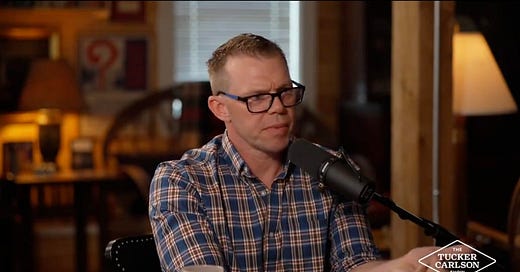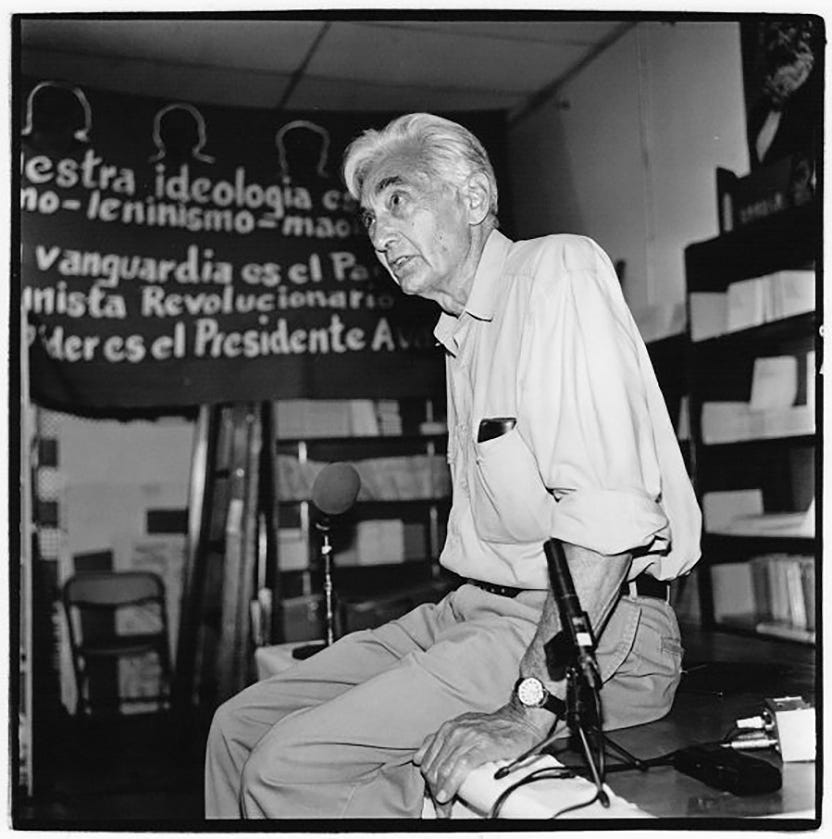The craziest interview of the year just took place a couple days ago. I thought it would stick to people interested in history, or a history, I suppose. However, it seems to be gaining purchase in several other spheres, likely due to the host. This is obviously the now infamous interview of Darryl Cooper, AKA MartyrMade.
Before I get to the content of that, I want to be transparent about my knowledge of Cooper prior to this interview. I have been a fan of his work since early 2023, when I listened to his podcast on Israel, Fear and Loathing in New Jerusalem. I found this series compelling and thoroughly researched1 and presented. I later listened to more of his podcast and greatly enjoyed his episodes on the Dostoevsky-Nietzsche connection and the horrors of Soviet Communism. To me, he seemed like a more harrowing version of Dan Carlin, and I was never going to turn down more content like Hardcore History.
But over the past year, and more specifically over the last month, I have been driven away from his work. I don’t know if this was always the case and I am just now noticing it more clearly, but he seems to have fallen deeply into the conspiratorial that Carlson has become an exemplar of. His sole purpose seems to have become to undermine generally accepted narratives, no matter how well sourced and widely accepted.
Now, I’m not saying subverting narratives is a bad thing. I have advocated for it several times, myself. But, when your subversion is done with a certain carelessness towards the facts, you begin to fall outside the “historian” label and into the “activist” one. In other words, you become Howard Zinn. You begin to create your own narratives of history to challenge the mainstream historians. Zinn’s stated goal was to look at
the discovery of America from the viewpoint of the Arawaks, of the Constitution from the standpoint of the slaves, of Andrew Jackson as seen by the Cherokees, of the Civil War as seen by the New York Irish … the Gilded Age as seen by southern farmers, the First World War as seen by socialists, the Second World War as seen by pacifists, the New Deal as seen by blacks in Harlem, the postwar American empire as seen by peons in Latin America.
In the end he was looking at history through a singular lens: power. For Zinn, the American empire needed to be cut down to size, that their lust for power and profits throughout the world left the world a worse place and anyway to undermine that was worth it.
There is a similar vein in Cooper’s work. He too disdains the American empire, but not from the left, from the right. He lauds authoritarians that stand up against the decay of Western society, and disdains the power of the “regime,” the elite political and media establishment. In the interview itself he describes his purpose as shining a light on the mythology in the west and laying bear the ugly reality that’s hidden underneath the glossy exterior.
Again, I am not against this method per se, I think challenging the myths that permeate our understanding of history is a good thing. That’s the entire goal of my podcast! But when Cooper starts to say things like people “ended up dead” in the concentration camps, and “Winston Churchill was the true villain,” he better have some compelling sources from a variety of sources. But, given the fact that David Irving is touting this interview as an exceptional interview uncovering many truths, I doubt that is the case.
I think I see both Zinn and Cooper as cautionary tales. Zinn was not a trailblazer when he wrote A People’s History. The radical historians of which he was associated had been around since the 1960s. They were writing social histories from the black, or female, or Native perspective for two decades before he burst on the scene. He was never involved in rigorous academic research and shied away from any chance at being criticized. He was able to cultivate a view of history that was purely anti-American and apologetic to the USSR. Without facing any challenge, peddled his work as the truth that was kept hidden away from history classes to prevent popular uprisings.
Cooper has snuck under the radar as well. He has likely not faced direct criticism from many experts in the field. That’s all fine and good for an amateur historian, but now he is being heralded as the “best and most honest popular historian” by Tucker Carlson, who has an extremely loyal following. I have issues with following the history establishment2 blindly, but it would benefit Cooper, and ultimately the world, if he was challenged by reputable historians. He would be forced to cite his sources directly and make his arguments clearly. But instead, he can dig deeper and deeper into research from a very specific perspective and mix truth and fiction to tell a good story. By the end he comes out blaming the Rothschilds for all the ills of the world, something he urged against in his own work. Perhaps this exposure is what he needed, but it seems unlikely he will do anything but double down.
Confirmation bias is natural when it comes to learning. It is difficult, and downright exhausting, to actively challenge your beliefs consistently. For most people, there is little need to do that. But when your work is public, it is necessary. I have grappled with this issue and will continue to do so. There are functionally infinite books to learn from, so curating a list that allows for different perspectives to fight in your mind, allowing the truth to illuminate itself can quickly become a full-time job. But picking books simply because they challenge the mainstream narrative is dark one.
By doing this, Zinn and Cooper aren’t trailblazers, they’re hucksters. They repeat that with which they agree with and ignore the challenges since they are trying to bring forward the hidden truth. The problem is, they don’t seem to understand that these truths that they now hold so dear are not hidden because they are dangerous, they are hidden because they are false. The cute little narrative bows that they fashion out of these ribbons of falsehood turn into Gordian knots that only the truth can cut through. I can only hope that more and more people start to wield that blade.
I’m not sure why this anti-American sentiment has found its way in the political right, but it is concerning to me. A reaction against the Zinnites is understandable, as that was itself a reaction to a period of Jingoism. But, instead of reacting to anti-American sentiments with pro-American ones, pro-Soviet ideals were replaced with pro-Nazi. It does not bode well when the center is being pincered by historical communicators who despise the country they live in. Even worse when these ideas are not challenged, and in many cases repeated without reflection, without pushback. I understand the need to upset institutions that reach far beyond their purview and begin damaging the nation. But it is only more destructive to use the same tactics yourself. It is imperative that those born around when I was are not exposed to these skewed views of history with nothing to combat it. That is my goal. Whether I succeed or fail is still up in the air, but I hope my voice can help make a difference and steer us away from another Howard Zinn.
I have been informed that it actually is lacking in facts and makes large jumps in logic. But at the time, I enjoyed it.
If such a thing exists.







Hi Scott, most history is written by the “winners” or “conquerors,” or political movements. Rarely is history written by the defeated, the minority or those discriminated against. Writers starting in the 1960’s began to change that and as you point out they definitely leave out some inconvenient facts. There is always some political agenda that they promote. You do a nice job of pointing out the false facts. Lately, I’ve been looking at World history as a whole from 30,000 feet to see the connections that the historical epochs have. I also like to study the cultural & religious influences have on history.
Nicely done, and the title itself is golden.